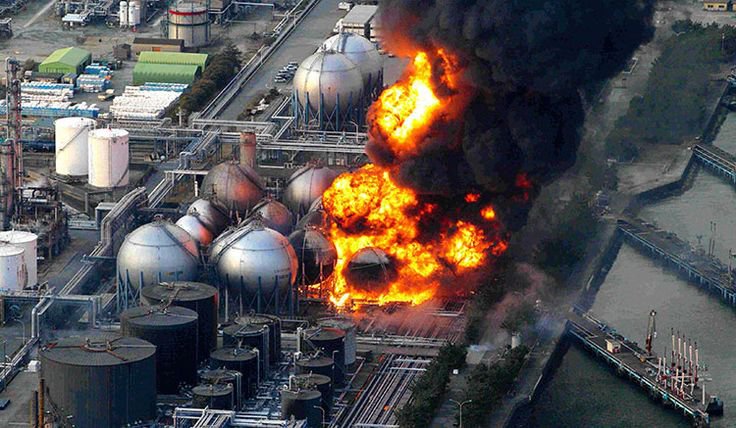
▲Fukushima nuclear accident |
In 2011, the Fukushima Nuclear Power Plant was destroyed by the tsunami and severe earthquake in eastern Japan. The plant was flooded, damaging power and cooling systems, leading to hydrogen explosions and leaking large amounts of radioactive material. At that time, there was a high concentration of contaminated water in the nuclear power plant building, amounting to about 120,000 tons. High levels of radioactive debris were scattered there within the nuclear power plant site. A year later, radiation was still being measured near the 20-kilometer radius of the Fukushima plant, which is too high for humans to come close to. After the accident, mutations appeared and livestock that ate grass which was contaminated with radiation died. Even some residents living in Fukushima suffered health damage from leukemia or thyroid cancer. To resolve the situation, TEPCO (Tokyo Electric Power Company) employees risked deadly radiation exposure to restore the plant, but the work was not done quickly. So "Robots For Extreme Conditions" are being used for clean up. Unfortunately, the problem is that these robots are also radiation-contaminated robots. The Japanese government and TEPCO plan to terminate the second nuclear power plant within 40 years at the latest.
In South Korea, the government took steps to avoid serious damage. On March 14, 2011, the government conducted radiation tests on Japanese food imports and banned imports of some items. Despite the marine products that passed the imported food inspection system, some radioactive materials were detected in the Japanese fish we eat. South Korea proposed the following measures as a way to deal with it. Previously, only fishery products with more than the standard level were banned from eight prefectures, and it was decided two years later that all fishery products in eight prefectures should be banned. Japan protested, saying it hopes to respond with scientific results. When Korea started to conduct a field survey in Japan to obtain scientific evidence, Japan lodged a complaint with the WTO against Korea and insisted that its fishery products could be safely eaten. In 2018, South Korea lost the case against Korea’s import ban on Fukushima fisheries products. The WTO said the reason is that South Korea's comprehensive ban on imports to neighboring areas violates related agreements. The Government of the Republic of Korea appealed to the WTO again, and finally, the result of the final review ruled that our import regulation was consistent with the WTO agreement. The WTO's Appellate Body overturned the first ruling, saying Korea's import ban does not constitute arbitrary discrimination and does not constitute an unfair trade restriction. With the ruling, all fishery products in eight Japanese prefectures are banned from import, and additional inspection certificates will be requested if all Japanese imported food products are found to contain even a trace amount of radiation. Later, Japan's foreign minister, Kono Taro, announced that he would continue to demand South Korea lift its import quota. Eight years after the Fukushima nuclear accident, South Korea was able to fully regulate it. However, Japan is reportedly considering a plan to release 1.11 million tons of radioactive water off the coast of Fukushima that continues to build up in the course of handling the accident. The Korean Federation For Environmental Movement argued that the government and the National Assembly should no longer leave the issue unattended, calling on the Japanese government to withdraw its plan to release radioactive contaminated water from the Fukushima nuclear power plant. We're not completely safe from radiation yet, and we don't know what else will happen. So, we should take caution and the government should protect the people’s food and rights by publicizing the facts.
By Bae Yun-Bin binibbo99@naver.com
<저작권자 © The Campus Journal, 무단 전재 및 재배포 금지>

 Shrinkflation, Consumer Deception
Shrinkflation, Consumer Deception




